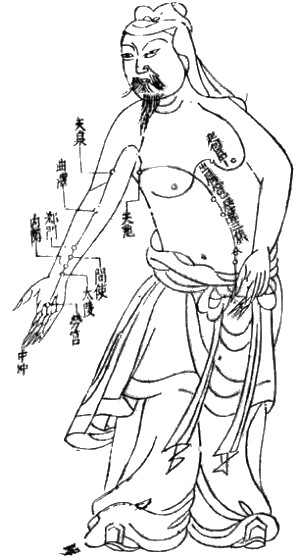
Acupuncture chart from the Ming Dynasty: The Pericardium Meridian of Hand-Jueyin (Photo credit: Wikipedia)
“In ancient times those people who understood the ways of nature, patterned themselves upon the yin and yang. Modern man drinks wine like water, leads an irregular life, engaging in sexual intercourse while he is drunk thus exhausting his vital energy. They do not know how to preserve their ‘vital force, wasting energy excessively seeking only physical pleasure, all of which is against the rules of nature. For these reasons they reach only half of the hundred years and then they degenerate.”
The goal of western medicine is to fix what is already broken. The art and science of conventional medicine in the U.S. uses tools to identify risks for illness such as cholesterol levels that in turn determine a standard of treatment (diet, exercise, medication) or diagnose an illness such as strep throat. While there are many positives to this approach there are challenges as well. According to Dr. Frank Lipman, there are 18 big problems with modern medicine, two are:
1. “Doctors often merely manage symptoms”
2. “Symptoms are seen as something to be suppressed rather than a pointer to some underlying imbalance.”
You can read the others here, http://www.care2.com/greenliving/18-biggest-problems-with-modern-medicine.html.
Eastern medicine or traditional Chinese Medicine (TCM) has been practiced for over 2000 years and uses the Tao (“the way” or the way of a balanced life) philosophy. Physical observation (of the tongue, sweat, abdomen or changes in body temperature, sleep pattern, digestion, bowel movements) is the main vehicle used to drive diagnosis and treatment.
This goal of TCM is to maintain chi (Qi, written in Chinese 氣) or vital energy and balance the natural force of yin and yang, http://nccam.nih.gov/health/whatiscam/chinesemed.htm; and there is science behind it, http://www.worldscientific.com/worldscinet/ajcm. While this concept may seem far-fetched, qi may be more easily understood if you consider that the body has vital energy, for example, in the form of electrical charges for example when you walk on a rug and get shocked or that when blood flow to an organ/body part is disrupted there are severe consequences such as amputation.
Similar to western medicine, eastern medicine believes diet, exercise, rest and mental attitude are the paths to attaining and maintaining health, yet the path to health is different. Qigong (breathing exercises) and physical exercise (tai chi), acupuncture, moxibustion (fire/heat treatment that warms acupuncture points and stimulates circulation) and Tuina (pronounced “twee nah”) is a massage that works on muscles and nerves) all work to engage acupressure points and meridians to remove blockages that prevent the free flow of qi and promote good health.
The mind also plays a role in balancing chi with the practice of meditation and forgiveness for positive mental health. The role of forgiveness in health has been studied at Berkeley, http://greatergood.berkeley.edu/article/item/the_new_science_of_forgiveness;”Unforgiveness, seems to be a negative emotional state where an offended person maintains feelings of resentment, hostility, anger, and hatred toward the person who offended him”.
“In one study, pressure, heart rate, facial muscle tension, and sweat gland activity were monitored in volunteers who agreed to think of someone who had hurt, mistreated, or offended them. While they thought about this person and his or her past offense, blood pressure and heart rate increased, and they sweated more. Ruminating about their grudges was stressful, and subjects found the rumination unpleasant. It made them feel angry, sad, anxious, and less in control. When they practiced forgiveness, their physical arousal coasted downward.”
One way to learn how to forgive is practice the suggestions in this article, http://www.ehow.com/how_5018417_forgive-taoist-way.html.
Nutritional and herbal views of TCM are based on the five flavors (bitter, salty, pungent, sweet, sour), tonification of yin & yang , deficiencies in Qi and blood and the relation between cool, warm, damp, dry and body organs. http://www.lotusrootacupuncture.com/nutritition.html.
While Chinese medicine is not customary in the Western part of the world, with what is understood today, it seems it may be a complimentary approach to conventional medical practice.
Bringing Eastern Medicine to the table broadens our ability to heal and understand health from a broader perspective. Incorporating attention to Qi, creating harmony between the body, mind and spirit seem to only add to quality of life and expand on medical care success. It is not necessary to choose Western over Eastern medicine but use them together for better health outcomes.







Thanks for finally talking about >Optimize Your Health Bring Eastern Medicine To The Table | Valerie’s Voice: For the Health of It <Loved it!